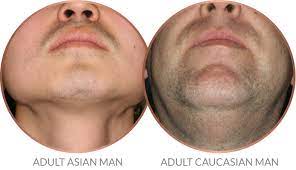
Hirsutism refers to the growth of coarse, dark hair where women typically only have fine peach fuzz or none at all. This condition is caused by increased levels of androgens produced in either the ovaries or adrenal glands and leading to an imbalance. Women suffering from hirsutism often feel self-conscious about their appearance and may suffer physical and emotional health complications as a result. A comprehensive evaluation by a health care provider can identify its cause and offer treatment solutions. Excessive facial and body hair in women can be treated using prescription creams like elfornithine that work to slow its growth. Some women suffering from hormone conditions that lead to hirsutism require lifelong therapy to keep symptoms in check; such as polycystic ovary syndrome that alters sexual hormone balance resulting in excessive body hair. Oral contraceptives or medicines which block androgen effects on hair follicles could also help.
Women may develop facial hair, though usually at much lower rates than men. This condition, known as hirsutism, results from hormonal fluctuations; women who notice that they have facial hair may need to consult a specialist in hormone disorders or skin problems to get assessed further.
Cushing syndrome occurs when adrenal glands produce too much cortisol. This can lead to excessive hair growth as well as other symptoms like weight gain, round facial features, thin purple streaks of stretch marks on the abdomen, hips, and thighs, thin easily bruised skin, irregular menstruation, high blood pressure, and osteoporosis. This condition is more prevalent among females and can be brought on by various sources, including certain medications, tumors on the adrenal glands, or an ectopic ACTH syndrome.
Testosterone is an important sex hormone that plays an integral part in male characteristics, including facial hair growth. Low testosterone levels can result in balding or patchy beard growth in men. Maintaining adequate testosterone levels requires proper treatment, including diet and exercise. Eating lean proteins, iron-rich foods, whole grains, and vegetables, along with taking vitamins or supplements, can support hormonal equilibrium.
Facial hair may be caused by an imbalance of hormones. Women suffering from polycystic ovary syndrome (PCOS) often develop facial hair due to increased dihydroxytestosterone production, which encourages hair growth. If you experience sudden or excessive facial hair growth, consult your physician who may suggest hormone replacement therapy.
Note: The article discusses different types of facial hair growth, including hirsutism, postmenopause, Cushing’s syndrome, low testosterone levels, and hormonal imbalances. Proper evaluation and treatment by healthcare professionals are important for managing these conditions.

